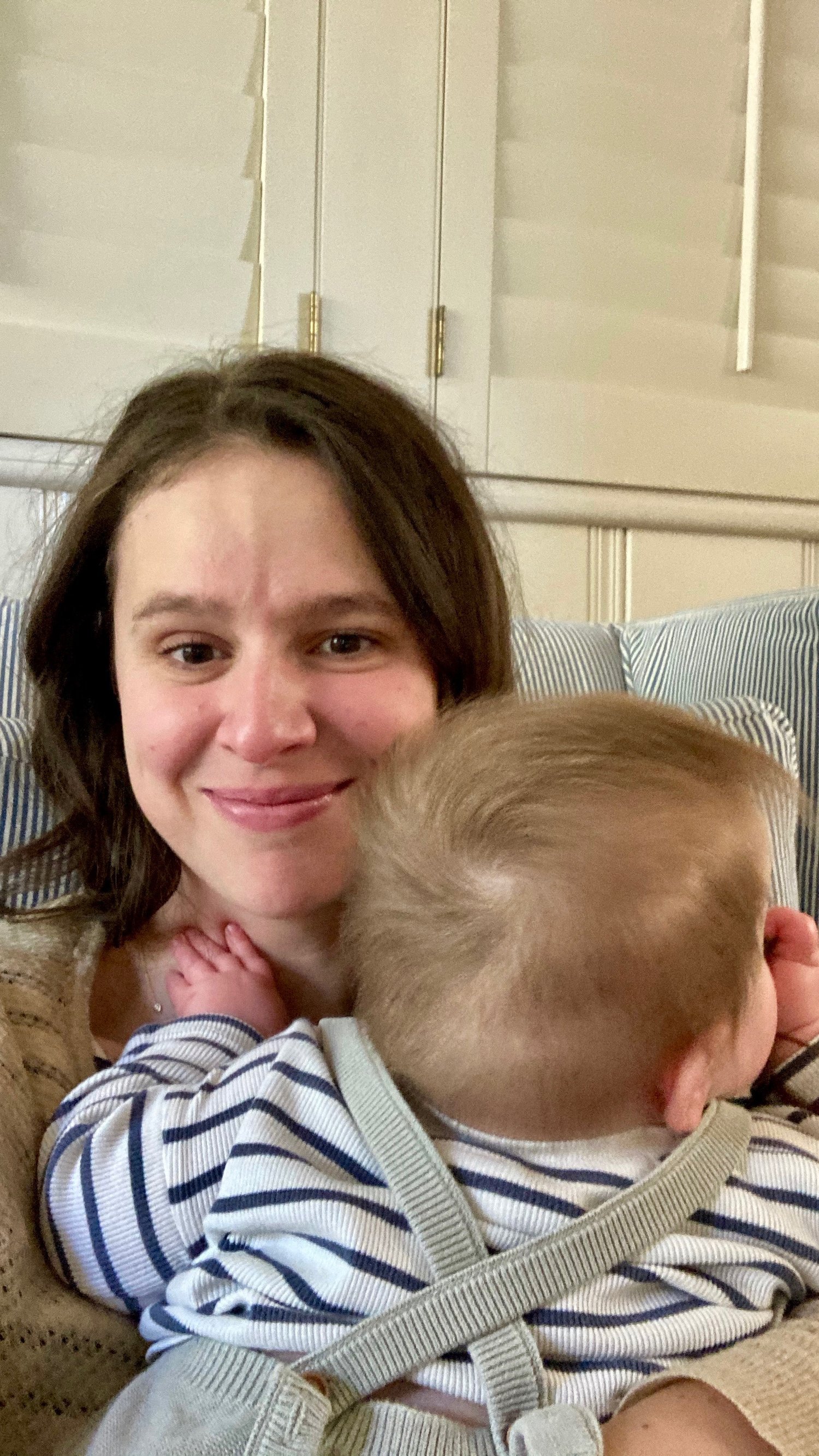Blog
Featured in: Redfin's blog
Redfin recently featured some of my thoughts about downsizing on their blog, in an article called: Toss or Keep? How to Downsize Your Belongings and Simplify Your Life.
I actually love this topic — on a personal level, I’ve radically changed my relationship to keeping stuff, over the past decade. I used to be someone who had difficulty throwing away anything that still functioned, didn’t have holes in it, or might “one day” be useful. As a result, my apartments and dorm rooms always felt cluttered.
I changed my mindset towards stuff, and now my home is almost always neat. (It’s much easier to be neat when you don’t have too much stuff).
You can read the full piece here with ideas from lots of experts, or here’s just one tip from me:
I recommend that clients identify what it means about them, to get rid of something.
Often, we will feel that it means something bad about our identity if we get rid of an object. For example: Does it mean that they are a bad sister, if they get rid of the kitchen tool their brother got them as a gift?
And for the real juicy question, I would ask: How could getting rid of that kitchen tool make them a good sister? Perhaps they’d feel lighter, and show up more open-hearted to the relationship — or they’d pass it on to someone who could really enjoy it.
If your brain is in the right place, everything else is easy.
Interested in more on this topic of identity and how it can get triggered? Check out this past blog post, as well.
As always, I’m rooting for you. You’ve got this.
Katie
If this essay resonated with you, you'll love my newsletter. Sign up for free + get new ideas every Sunday!
Want to achieve your goals faster? I don't always recommend it
In my experience, going too fast is far more dangerous than going too slow.
Oh, you want to implement some new healthy habits?
Show what you can do at work?
Make meaningful progress on a passion project?
I will say it again: going too fast is far more dangerous than going too slow.
As a life coach, I see it time and again: we bite off an amount that seems reasonable. Heck, it seems like less than “lots of other people do every day”!
And yet – it’s too much. We can’t keep it up. We’re tired, we’re discouraged. Of course, if we want it enough, we’ll eventually pick it up again — but we’ve wasted so much time and energy in the drama, frustration, and meandering path.
…
The crazy, not-said-enough thing is:
It takes discipline, to purposefully constrain yourself to a slower, truly sustainable pace.
In other words: It may feel frustrating and terrible, to go slowly. You’ll think: But I can do more! I have more in me! There’s fuel in the tank!
Yes. That’s exactly the point.
You need to have more than enough fuel on some days — so that on other days when your fuel is far less, you’ll still have enough. So you can avoid flaming out, on an empty tank, by the side of the road. (Or, less dramatically, watching TikTok instead of doing your newfound healthy habits, or working on your screenplay.)
Repeat after me: going too fast is far more dangerous than going too slow.
Slow will get you there every time, team.
…
As always, I’m rooting for you in the week ahead. You’ve got this.
Katie
p.s. Yes, this lesson is age-old. (See also: the tortoise and the hare.) But I find that many of us — me included —need a reminder, sometimes.
p.p.s. Would you like me to be your life coach? I specialize in working with people who are already pretty “together” in their lives — paying their bills, and meeting their commitments. But just because your life looks pretty good on paper, doesn’t necessarily mean that it feels right to you, from the inside out. Learn more.
Sign up for my newsletter to get helpful + encouraging essays like this every Sunday morning. It’s free!
How to feel sad in a useful way
One of my clients had been feeling “bad” for a long time.
This client was a C-suite executive at a major regional organization, and a highly competent professional.
But he was also completely overwhelmed at work, and exhausted all day. He had so much anxiety in his body, that he’d stopped feeling his body at all. He spent all day in his (very smart) head.
This client was desperate to feel better — understandably!
And yet, one of the first things I told him was: “You need to focus on processing your feelings.”
He balked at this. “I feel all the time!” he told me. “If I come home from work and my wife’s not there, all I do is feel anxious. All of my thoughts and worries and anxieties come rushing back in.”
And that was exactly what I feared.
One thing that I have observed — which I think is not said often enough — is that we can “feel bad” frequently — but without actually processing that emotion.
You will know that you are actually processing your emotion when you feel some amount of relief afterwards. There is an experience of metabolizing the feeling — allowing it to flow through you, and become something different.
You might not feel joyful and sparkly afterwards – but you will feel a sense that the intensity is at least somewhat less than before (and, typically, significantly less).
This often requires inhabiting the feeling or sensation much more deeply and directly than you are doing now.
And something miraculous typically occurs when we do this: not only do we feel much better, we also often get useful insights about our lives: information about what we do and don’t want, or what next actions to take.
…
Learning how to process emotions can take some time — it’s subtle and iterative, and something I often do with my 1:1 life coaching clients — but today, I wanted to share a few prompts to begin that process:
Close your eyes, take a few deep breaths, and call to mind an emotional or physical sensation you’ve been avoiding.
Notice what that feeling is like in your body. Is it a tightness in your chest? A zinging in your belly? A rock in your throat?
(If you can’t feel anything, don’t worry. Many people feel numb at first and unable to access physical sensations. But as virtually all of my clients would attest, it can be learned.)Do not try to change the feeling, push it down, or make it go away. Just let it be there, however it happens to be.
Mentally tell that feeling: You can stay as long as you’d like, and become whatever you want to become — bigger, smaller, something different.The key is then to sit with that sensation, and give it all of the space it needs. I like to imagine kindly giving the feeling an enormous, spacious room to be in, or a wide field. Sometimes it may feel like the feeling gets bigger, more intense. Sometimes new feelings will arise.
Allow each feeling to arise, becoming whatever it needs to be. Typically after several minutes of this, you will start to feel better.
When I did this with my (admittedly skeptical) client – he looked at me afterward with some surprise: I feel better, he told me.
…
So many of us spend our lives feeling low-grade bad, but we avoid those feelings for obvious reasons: If we felt them more directly, we’d feel more bad, right?
And yet, the opposite is typically true: when we feel them directly, we end up feeling better, not worse. Typically, the feelings never last as long as we expect them to.
But the only way around them is through them.
And if you take one thing away from this essay let it be this:
If you’ve been feeling bad, for a long time, it might be time to point your compass directly towards the swamp of messy feelings.
You might blow your mind.
…
As always, I’m rooting for you in the week ahead. You’ve got this.
Katie
p.s. My past and current clients are probably smiling as they read this essay: few of my clients can escape working with me, without learning how to process feelings and sensations better. Almost all of them become less afraid of intense feelings and more capable of moving on from them more effectively.
If you’ve been feeling low-level (or high-level) “bad” for a long time, I’d highly recommend working with me 1:1. The first steps are here.
Sign up for my newsletter to get helpful + encouraging essays like this every Sunday morning. It’s free!
The difference between reading a tip and actually making changes (hint: getting a coach can help)
A lot of people think that they just need a good tip in order to solve their problem. Just the right piece of advice.
But here’s the thing: Advice and tips – they’re easy to find.
Google any topic.
Walk into any bookstore.
Read any self-development newsletter.
You’ll find lots of tips on any topic — including whatever is bothering you right now.
How to feel less anxious, stressed, stuck, or uninspired.
How to stop using food or the internet in a way you don’t like.
How to work fewer hours without sacrificing quality.
How to heal from burnout.
How to have a better relationship with your partner, your friends, yourself.
There’s nothing wrong with tips — they can be quite useful. (Especially this essay, of course.)
And yet.
And yet, you could probably rattle off a list of “tips” to deal with any problem you currently have.
And yet, you still have those problems, don’t you?
…
But if you really want to change in a meaningful, lasting way — tips are usually not enough.
If you really want to change in a meaningful, lasting way —that’s when you need life coaching.
Every client I’ve worked with has incredibly personalized reasons why they’re in the stuck or anxious or tired or uninspired state they’re in. Working with me can help you identify those roadblocks — which are usually blind spots that you genuinely cannot see — and develop new, profoundly individualized ways of interpreting and responding to the same situations.
Then, we talk about actions. Sure, there might be a tip or two you’ve heard of before — but that’s not the real value. The real value is that you have a step-by-step, iterative, genuinely-doable process to get you from here to where you want to be.
No advice you read in a book or internet article could ever be so uniquely customized to your very particular fears, needs, strengths, and weaknesses.
…
I really hope you love these essays – but coaching with me is completely different than these essays.
It’s the difference between reading about an idea…and actually making a change that is profoundly right for you.
It’s way better.
I maintain a small, high-end 1:1 life coaching practice. If you’d like to be my next client, learn more or reach out here.
As always, I’m rooting for you. You’ve got this.
Katie
Sign up for my newsletter to get helpful + encouraging essays like this every Sunday morning. It’s free!
The most common thought error about making mistakes
Someone dear to me recently had a minor fender bender. She was pulling out of the supermarket parking lot…and ran into a car she didn’t see coming.
Luckily, everyone was fine, and insurance would cover the repairs.
But when I talked to her, she was still beating herself up.
“If I’d just looked more carefully,” She told me, “this whole thing wouldn’t have happened. I should have been more careful.”
It should be said: this person is very careful. She’s the one who double checks her flights, and always brings a sweater in case it gets cold.
And also: it is true that the immediate cause of the accident was that she didn’t look carefully enough, on that particular day. She was the one who drove into the other car. It was her “fault.”
But, underneath, there was significant thought error:
Her brain thought that if she was careful enough, she’d never make mistakes.
“What if you assumed that some percentage of the time, you’ll mess up.” I told her. “No matter what, no matter how careful you are, how thoughtful — there is simply no way to avoid messing up some percentage of the time. Your brain isn’t a machine, and it will mis-fire sometimes. This happens to everyone, no matter how careful.”
“Sometimes these mistakes be small, and sometimes they will be significant,” I told her. “All that happened was that this was one of yours.”
Over the phone, I could hear her relief, and also her doubt.
Relief, because it felt good to not feel so guilty.
And doubt, because, well… was she allowed to think that?
I pointed out that I wasn’t saying she couldn’t be careful about her life. I was just suggesting that despite that care, she was still going to make mistakes.
Guaranteed.
…
So, this weekend, I just wanted to offer you the same thought to play with:
I will make mistakes — small and big — some percentage of the time. It is inevitable, and no amount of carefulness will allow me to avoid it.
Think of a recent time when you made a mistake. How does seeing it through this lens change your attitude towards it?
…
As always, I’m rooting for you in the week ahead. You’ve got this.
Katie
p.s. This essay is such a great example of something I do frequently with my clients: help them see the thought errors they are making (which can be very hard to see on our own) + helping them cultivate believable thoughts that serve them better.
I have one opening for a new client to start in July. If you’d like to work with me, learn more here.
Sign up for my newsletter to get helpful + encouraging essays like this every Sunday morning. It’s free!
One (nearly effortless) way to improve productivity
Some time ago, one of my clients came to our session very stressed about a huge project with a deadline several months down the road. She was applying to an MFA program, while also working a job — and needed several excellent writing samples, plus recommendations, personal statements, and more.
Would she get everything done in time?
And would she be able to do it, while balancing it with her other priorities (relationships, physical and mental well-being)?
But as we talked about it in more detail, it became clear that this goal could be done, with ease and spaciousness, if she worked on it for an hour in the morning, and 30-45 minutes in the early afternoon.
This amount of time was a commitment. But also, it was extremely important goal for her, and she’s already cleared her calendar to have more than enough time each day.
It actually wasn’t that complicated.
It wasn’t dramatic at all.
It was just math.
By the end of our session together, her body was so different than when we began. She seemed calm, open.
Thinking about it made me want to remind you of something:
Drama-free is a freaking amazing way to live.
Most big, scary things can, often, be accomplished with significantly less drama. And when you remove (or radically lessen) the drama, then it’s just execution.
And of course, sometimes it feels impossible to do them without drama. If that’s true for you, your first drama-removal step might be to get support. (This is something that I specialize in, if you’d like to work together.)
But consider a big project that you’re overwhelmed by:
How can you do it without drama?
…
Oh, and that client emailed me, months later, to say that she accomplished that goal beyond her wildest dreams.
The top MFA program in the country? IN.
Multiple fully-funded, also-top-notch MFA programs? IN, IN, IN.
A huge congratulations to her for her massive talent.
And additional congratulations, of course, for her massively lower-drama execution.
…
As always, I’m rooting for you in the week ahead. You’ve got this.
Katie
p.s. Do you have something you want out of life — a concrete goal? Or maybe it’s just something you’d like to feel more of – calmer, more confident, more sparkly? Working with a life coach can help you not only accomplish that goal, but do so with so much more ease and less drama.
I have one opening for a new client to start in July. If you’d like to work with me, learn more here.
Sign up for my newsletter to get helpful + encouraging essays like this every Sunday morning. It’s free!
Why recovering from burnout can be so hard
Severe burnout can be a difficult recovery process.
Here’s something I’ve noticed, time and again, about recovering from a completely empty tank:
When we finally start to refill our tanks, there is often an extended period of time when we are recovering… but we don’t feel better.
In other words:
We finally have a bit more time.
We’re finally resting.
We’re finally doing some useful self-care practices.
… And we don’t feel better.
As you can imagine, this is a tough time. It’s when I’ve started to feel quite anxious. It’s when my coaching clients sometimes start to panic:
Will I ever feel better? I’m doing all the right things!
Am I doomed to feel exhausted… forever?
This phase can last weeks. Occasionally — if the burnout was extreme — for months.
…
So, how do you recover from burnout?
All I can say to you is: keep going.
You will start to feel better, perhaps quite suddenly. When this happens, you will realize that your tank was slowly refilling before, but you were so tired that you couldn’t feel it. I’ve seen it happen over and over with my clients, and with myself.
(Of course, this is dependent on you actually taking steps to refill your tank. If you’re just doing the same ol’ things that burned you out to begin with, I can’t promise you’ll suddenly feel better one day.)
…
Using a life coach can be really beneficial for when you’re feeling like you need some help.
I know that when we are lost in the wilderness of exhaustion and burnout, everything can feel overwhelming.
So let me be a steadying guide: Keep going. It’s working.
Keep going, my friend.
Katie
p.s. If you’re stuck doing the same things and can’t see a way out of burnout and an empty tank, I’d recommend working with me 1:1.
The journey can seem completely overwhelming on your own — but with the help of an experienced coach who can suggest personalized, iterative steps — it’s a completely different, and much more doable process.
Learn more about working with me here.
Sign up for my newsletter to get helpful + encouraging essays like this every Sunday morning. It’s free!
How to be a “good person” (a controversial take)
One of my clients had a job in the entertainment industry he loved and was very good at — but felt a lot of guilt.
If he was really a “good person,” he told me, he’d be working with the homeless.
This is a very common anxiety I hear from my 1:1 coaching clients. We want something, but we feel that we can’t be a “good person” and have that thing. So today, I wanted to share 3 concepts I often tell my clients, when they’re having these anxieties:
1. Question your brain’s “evidence” about how to be a good person. Could the opposite be true?
That same client who worked in entertainment told me about a small side project he’d worked on — just for fun, outside of his regular work hours.
Lots of people told him how much they enjoyed this project — including the mom of a child with Autism, who wrote him an email to say that her son spent hours every day on it; that it brought him relief and pleasure, especially when he was overstimulated.
Huh, I said to him.
Why is your brain saying that the only way to be a good person is to leave your career and work with the homeless? Why isn’t the way you brightened up that boy’s life equally useful and important?
Is it possible that there are many more people who you’ve helped, who never contacted you?
And then I gave him a real nudge: how could the job that you’re doing be *better* for the world as a whole than leaving your career to work with the homeless?
…
My goal is never to force my clients to believe anything. It’s simply to invite them to loosen their brain’s fixation, and to allow their brains to hold multiple possibilities. I could come up with many scenarios about how he creates more value for the world on his current path — if his brain can’t access those possibilities, it’s too narrowly constrained.
2. The best actions for the world are the ones that energize you and are good for the world.
In my opinion, there are an infinite number of actions that would be good for the world. The key question is: how do you choose between them?
When you choose actions that drain you, you have far less energy to do future good-for-the-world actions.
When you choose actions that energize you — you have more energy for future good-for-the-world actions.
So: How do you choose? I think the answer here is obvious.
3. People’s “goodness” cannot be ranked.
Can you rank everyone you know based on how good they are? How do you do that?
Based on the number of hours they volunteer?
How often they smile?
How often they write thank-you notes?
How nice they are to a cashier at Trader Joe’s?
How nice they are to you?
Okay, sure, but some people are obviously bad, right? Or at least, on the “bad” end of things.
To that I would say: I’m not so sure. What may seem easy to someone — being kind, or even, being polite or respectful or law-abiding — may genuinely be impossible to another person. This may be due to profound differences in neurological structure — or even profound differences in how someone is raised, the trauma they have experienced, and more.
And if we can’t rank people by goodness… then you cannot be a less “good” person.
[That one might make your head explode a bit. You can always just chew on it in the background for a while.]
…
I am very aware that some of this may feel controversial in your brain.
“There is a hierarchy of good person actions!” your brain might think.
Or: “It’s selfish to want to do only good person things that also energize you!”
Or perhaps, even: “You’re not a good person for believing these things, Katie!”
To be honest, I’m okay with that.
You know why? A core belief of mine is: When I believe these three points, I have more energy, more enthusiasm, more ideas…and I do more good for the world.
And I freaking love that belief. I feel that it profoundly serves me and the world.
You are welcome to believe whatever you’d like.
But I’d recommend stealing my thoughts.
…
As always, I’m rooting for you in the week ahead. You’ve got this.
Katie
p.s. And that client in the entertainment industry? After quite a bit of work together (we go so much deeper in 1:1 coaching than in a short essay like this), he came to believe that it was possible to follow his passion and be a good person.
The relief of this gave him the energy to explore what he truly wanted to do. He ended up launching a venture on his own with his beloved wife — a long-held dream that he’d always been nervous to pursue — so he could make work he was so good at, in a way that was even more profoundly aligned with his values and interests.
p.p.s Interested in being one of my 1:1 clients? I’d love to get inside your brain + move the furniture around. Learn more here. And here’s what some past clients said about working with me.
Sign up for my newsletter to get helpful + encouraging essays like this every Sunday morning. It’s free!
On learning (+ being 100% Portuguese)
My husband is Portuguese. In fact, if he were here, he would like you to know that he is 100% Portuguese.
Several years ago, I set out to learn his native language. We got a beginner Portuguese textbook, and sat down for 45 minutes each week to work our way through.
Reader, It was rough.
Partly, Portuguese sounds were tough for my beginner mouth (In my opinion, European Portuguese sounds like a mix of a Slavic language — think Russian or Lithuanian — and saying the words “Oshkosh B’gosh” over and over.)
But mostly, it never seemed like I was really making progress.
Sure, we were slowly (so slowly!) inching our way through the textbook, but I often couldn’t even remember what we did in the week before. Was I making any progress?
I thought back to my days as a successful student:
There had been studying. There had been tests. There had been more than 45 minutes a week.
“I need to study,” I told my husband. “I’ll make flashcards, and vocab lists. I’ll quiz myself and review, so I can remember everything week to week.”
My husband listened to my plan. And then he calmly said it was a bad idea.
“If you keep showing up, you’re going to learn things.” He insisted. “Why don’t you just let yourself remember what you remember?”
I took his advice, mostly because I was busy and tired. It was only later that I realized he was suggesting an entirely new approach to learning for me.
…
When my husband corrected me on the pronunciation of the Portuguese letter “i” (i’s are always pronounced as “ee” in European Portuguese), I used to tense up and try to get the concept lodged in my memory.
But after deciding to just “remember what I remember,” I’d say: “I’m sure I’ll remember it eventually, if you keep reminding me.”
And then I did something incredible: I’d just “forget” about it. I just started assuming that eventually, that concept would get lodged in my memory.
And you know what? It freaking worked.
I started doing it with everything: vocabulary, conjugations, grammar.
Yes, my husband had to correct my pronunciation of the word “para” about a bajillion times (“para” can mean either “stop” or “for/to,” depending on the pronunciation of the first “a”). But also, I eventually totally got it — and now I do it without thinking.
I’m nowhere near fluent, but in the past several years, I’ve gotten to the point where my pronunciation is very passable, I can put together coherent sentences, and I can even eavesdrop a teensy bit on my husband’s phone conversations with his parents back in Portugal.
Our 45 minutes a week dropped to 35 minutes a week once my sons were born. And if there’s a been a lot of stress that week, sometimes 35 minutes doesn’t happen.
In 35 minutes or less a week… In allowing myself to remember what I remember…
… I have learned a lot.
…
I share this story, in the hopes of reminding you of two things:
Sometimes, the ways that we move through the world eventually stop serving us.
I was a successful student in high school and college (Magna Cum Laude at Princeton, thankyouverymuch) because of my rigorous approach to learning.
And yet, that same rigor made me associate learning with “tightness” and “stress.” Sometimes we have to completely take apart our old ways of doing things — ways which may have worked well for us in our past — in order to build something new. And that’s not only okay — it’s fantastic.Don’t underestimate what you can get done in 35 minutes a week.
Thirty-five minutes a week may seem, frankly, measly in the scale of a week. It may seem measly in the scale of a month. I’ve spent no time on this thing! How will I ever make progress?
But don’t underestimate the compounding effect over time.
…
Take care, my friends.
Or, as one says to a friend in Fazendas de Almeirim, Portugal (my husband’s hometown): Beijinhos.
Katie
p.s. It can it be tough to take apart + rebuild how you move through the world. You know what makes it 2x-100x easier? Having a life coach.
Here's what Jackie, one of my clients, said about working with me:
“I feel like the work I did in the past 6 months with Katie have catapulted me forward and I made progress in my own personal goals (weird eating habits, tech habits, personal art goals) that would have taken years if I had not worked with Katie."
Learn more about working with me here.
Sign up for my newsletter to get helpful + encouraging essays like this every Sunday morning. It’s free!
My advice for when other people don't like you (part 2)
Last week, I wrote about what to do when people don’t like you, or judge you.
I wanted to share one more insight on this topic, which always seems to land with my clients:
5% of people won’t like you — no matter what you do.
So if someone doesn’t like you, all it means is that you’ve found someone in that 5%.
When our brain freaks out because someone doesn’t like us, it is usually because we have the implicit belief: 100% of people should like me.
And yet, this is a thinking error.
It is impossible that 100% of people will like you. In fact, some percent of people (which I call 5%, but you can pick a different percentage if you like) will dislike you no matter what you do.
They won’t like your hair because they don’t like brunettes.
They won’t like your sense of humor because it reminds them of their annoying brother.
They won’t like you, because their ex-best-friend likes you and they hate their ex-best-friend.
If you, in an attempt to make them like you, changed your hair color or sense of humor… some other group of people wouldn’t like that.
Of course, it’s not rocket science that you can’t please all the people all the time. And yet, when we are upset that someone doesn’t like us, that’s typically what we are upset about.
So it can be useful to explicitly cultivate the thought:
5% of people won’t like me — no matter what I do. Now I have found someone in that 5%.
…
Several weeks ago, one of my clients was sharing, with clear pain, how her work colleague just didn’t seem to like her very much. It bothered her; she was trying every tool in her toolkit to turn the relationship around. And then I shared this concept with her.
Oh, I *was* assuming that if I did everything right, 100% of people would like me, she said.
But maybe this is just someone in that 5%.
Maybe I don’t have to change how she thinks of me…*at all.*
Relief.
Calm.
Even some giggles.
And you better believe she showed up better in that relationship — more confident, more interesting, and yes — more like-able — when she wasn’t trying to get her colleague to like her so much.
…
As always, I’m rooting for you in the week ahead. You’ve got this.
Katie
p.s. If you’d like more comfortable with people not liking you all the time, while also having more authentic, deeper romantic relationships and friendships (and not feeling like your chest is tight from low-level anxiety/exhaustion all the time), you should definitely hire me as your life coach.
To learn more about my work, click here.
Sign up for my newsletter to get helpful + encouraging essays like this every Sunday morning. It’s free!
My advice for when other people don't like you (part 1)
I’d like to make a radical suggestion:
When you fear that people are judging you — or even when you fear that they simply don’t like you — here’s what you should do:
Let them.
Let them think that you’re lazy.
Let them think you’re unintelligent.
Let them think you’re mean or inconsiderate.
Let them not like you.
Let them think all of those terrible things…. and do not try to change their minds.
And yes, this applies *even* to your boss/mom/best friend. It applies *especially* to them.
You might be surprised by what happens.
(What usually happens for me? Well, when I stop trying to manipulate them into thinking something positive about me… I feel radically more loving towards them. That, alone, loosens the relationship — and leads to many other positive results.)
As always, I’m rooting for you in the week ahead. You’ve got this.
Katie
p.s. I coach clients on all kinds of relationship issues — with their families, their partners, their friends, and their online dating profiles — and on everything from difficult conversations to people pleasing to loneliness to fostering deeper connections to setting effective boundaries (which often function differently than we assume). If you’d like to work with me, you can learn more here.
Sign up for my newsletter to get helpful + encouraging essays like this every Sunday morning. It’s free!
3 ideas on how to help you know what your most authentic self wants
Some time ago, I argued that if you truly know yourself, then it can be no big deal if people don’t agree with your decisions.
Reflecting on it, I realize that I wrote about “knowing yourself” as if it was the most straightforward thing in the world.
So, an important addendum:
“Knowing yourself” is not the most straightforward thing in the world.
In fact, it can be freaking hard.
For most people, it’s not that don’t know yourself at all. You probably do know that you love onion rings and reality TV, for example.
But if you struggle to make decisions, or to chart a path through life…you probably don’t know yourself as deeply as you might.
Here’s three tips that I’ve found helpful — for myself, and for my clients — in figuring out “how to know” yourself or what you want:
1. “Knowing” is more often done in the body, than the head.
Our smart brains can create a compelling argument for every side of the issue. That’s why pro-con lists can sometimes make us feel like we’re spinning out more, not less. By contrast: when we check in with our body sensations on a topic, we’re more likely to get a clearer, less variable answer. (More on that here.)
2. It’s often easier to feel our “no” than our “yes.”
For many people, it is easier to feel a “no” in your body than a “yes” in your body. My “no” is pretty consistent, and feels like a closed down and tight feeling in my heart + belly. (Wondering what your “no” feels like? Think of something as a clear “no” — an activity, a person, a job — and notice what sensations arise in your body.)
For most people, the experience of “yes” is more variable, and often more subtle, than a “no.” For me, sometimes a “yes” is just a mild feeling of spaciousness or openness. Sometimes it’s an almost imperceptible fluttering. If this idea of “checking in with your body” feels new to you, I suggest starting with finding a “no” feeling.
3. If your nervous system is highly agitated, it may be very hard to “know” anything.
Things that can agitate our nervous system include: being constantly busy, being exhausted, being chronically stimulated (this is why it can be hard to know what we want when we spend all of our free time on our phones).
If our nervous systems are agitated, it’s like an enormous amount of static, gumming up the phone line between you + yourself.
Some of us deal with this static by leaving our bodies — spending most of our lives as a floating head. In my experience as a coach, this is very common, especially with smart people. Whenever we do slow down or have quiet, we may feel extremely uncomfortable or agitated (it’s all of that static!) If this describes you, the first step is to calm your nervous system. Here’s one of my favorite daily practices to help with that.
…
For what it’s worth, when I say that it can be hard to know yourself, I speak from personal experience.
I spent years making pro-con lists about major life decisions, or doing what seemed like a “good idea” (which was usually shorthand for what seemed most impressive), because I didn’t actually know what I wanted. I was alternatively skeptical of people who seemed to know themselves + what they wanted on a core level…and deeply jealous.
And now, I’m one of them.
Which is to say: “knowing yourself” — knowing what you want in your bones and in your gut — it’s real.
And — maybe even more importantly — it’s achievable.
…
As always, I’m rooting for you in the week ahead. You’ve got this.
Katie
p.s. Knowing yourself is a skill — like tying your shoes. Some people get it more intuitively, and for others, it takes a bit of practice + maybe a bit of support.
Life coaching can be very, very helpful with this. I have one opening for a new client to start in May; if you'd like to snag that spot to work with me, you can learn more + reach out here.
Sign up for my newsletter to get helpful + encouraging essays like this every Sunday morning. It’s free!
Exhausted at work but can't take time off? Here's 6 ways to help
Many of my clients come to me with jobs that freaking exhaust them.
They tell me they absolutely have to quit their exhausting jobs, to become librarians or writers. Or live in airstreams by the sea. There’s no other way out.
I’m not against quitting one’s job, but today, I thought it might be helpful to share 6 ways that I help my clients have much more energy when their jobs are draining the life force out of them:
Get clear about your authentic priorities.
Many of us are unintentionally living as though “being a perfect employee” is our top life priority. But when we really think about it… it’s not.
Our priorities might be something more like: “I want to add a lot of value at work, while also having plenty of time to take care of myself and connect with my partner.”
The difference between showing up at work with the goal of “being a perfect employee” versus “I want to add a lot of value at work, while also having plenty of time to take care of myself and connect with my partner” can be night and day.Think new thoughts about your job.
You might be into this whole “I want to live in tune with my true values” idea.
But when you try to implement it, your brain might flip out. It might tell you things like: “You’ll get fired!” or “Your boss/colleagues will be so mad!” or “You can’t do a good job without working the way you’ve been working!”
These thoughts are very scary. They feel very true. So — you’ll keep working the way you’ve been working…which has been exhausting you.
And yet, far more often than we think, the thoughts that our brains are yelling are simply not true. In this example, it actually might be true that working in a way that would be in tune with your values would give you more energy, creativity, and resourcefulness, which might even (gasp!):Make you better at your job,
Delight your boss or colleagues,
Make you more likely to stay at your job (rather than quit to become a librarian or live in Portugal for a year). And yes… wait for it…
Make you more likely to eventually get promoted.
The way you think about your work situation deeply matters. If you believe that it’s irresponsible or careless to work less or work differently — you’ll simply never do it. This is something I often work with clients on: thinking new thoughts about the same situation.
(If you’d like to start thinking some new thoughts — here’s one way to get you started)You must work smarter, not harder.
I have never met a client who couldn’t put in less time and energy, with equal or superior results, by strategically shifting how they work. In other words: “working smarter.”
The tricky thing about working smarter (as with many of these points) is that it can be hard to see the opportunities in our own lives. This is where a coach who can point out opportunities you can’t see can be astonishingly useful.
But if you’d like to begin on your own, here’s one concept that I often share with my clients, as a way of kicking off the “work smarter” conversation.It might be time to build new skills.
Setting boundaries, making requests (for a new salary, for a promotion or a new project), having difficult conversations effectively with work colleagues, communicating well over email, processing and then letting go of anxiety when an interaction doesn’t go as you’d hoped — these are all things we can become more skillful at with time.
And “building skills” doesn’t have to be exhausting. I often find that my clients just need someone to point out a small new technique, tiny tweak, or opportunity they may have missed.Are you attending to what you need to attend to, outside of work?
Work is much less exhausting when we are well-rested, well-nourished, physically well, and emotionally supported in our out-of-work life. And yet: there can be a complex web of reasons why we might not, say, get meaningful rest, or have enough emotional support.
And here’s something I frequently find: my clients often think they know our out-of-work priorities, but as we dig deeper, it often turns out that their sense of priorities is actually no longer true for them. They think that they like how they spend their Saturdays, for example, but when we really dig in… it’s not working for them. Refreshing your priorities to help you get what you need right now often has astonishing dividends for work productivity and energy.
Coaching can help with that, too.Be thoughtful about when to leave, and when to stick it out.
Sometimes you can do all of the personal work in the world… but your job or your industry is just not suited to you. Coaching can help you tell the difference between the two, so you’re not stuck in anguish and mental drama about it.
…
If you take one thing from this essay, let it be this: There are many more opportunities to feel better at your job than you are currently seeing.
This is one (of many) areas in which life coaching can shine. Having a coach to talk through your specific situation in detail is worth its weight in gold (and in dollars and cents). If you’d like to work with me, you can find out more here.
But whether we work together or not, I hope this list gives you some ideas for where to start, if you ever start feeling exhausted by your job.
I’m rooting for you.
Katie
Sign up for my newsletter to get helpful + encouraging essays like this every Sunday morning. It’s free!
Being a beginner can suck. Here's one way to shift that mindset
Last week, I wrote about being a beginner. I made — in my opinion — a pretty compelling argument: if you’d like more vibrancy + sparkle in your life, being a beginner can help.
But there’s one more thing I want to say about this it’s-fabulous-to-be-a-beginner thing:
It can really suck to be a beginner.
I mean, sometimes it’s totally lovely + charming to be a beginner. I’m dancing the samba and I’m bad and I don’t care! But at other times, a beginner can bring up thoughts like:
I don’t know what I’m doing.
I’m terrible at this.
Everyone will *see* me being terrible at this. And judge me. And that judgement will cause something bad to happen.
These thoughts can be so scary that they stop us entirely from doing the thing that we want to do.
So today, I wanted to write to you the astonishingly effective tool I use to deal with painful thoughts like this. (And all kinds of other painful thoughts, actually).
The tool that I use is called Thought Work.*
I want to explain to you how it works, and then I’ll share a personal example of how I use it.
…
How it works:
There are two parts to Thought Work: (1) doing a thought download, and (2) analyzing your thoughts.
(1) Doing a Thought Download
Set a timer for 5 minutes, and write down every thought you have about a topic. (e.g., every thought you have about your attempts to learn French, or your new job). Thoughts can be judgements, fears, desires — anything. Just write down one per line on your paper, so it’s really easy to see each separate one.
(2) Analyze your thoughts.
Once you have all of your thoughts in a list, just take them one by one, and analyze them. You might ask yourself questions like:
In what ways is this thought true? In what ways is it not true?
Is there a thought that you think could be more true?
Could another thought be more useful to believe?
The point of this is to systematically examine your thinking. We often believe our thoughts as if we were reporting scientifically verifiable facts — when in reality, our thoughts are just beliefs. And someone else could just as easily… believe something completely different.
This practice may sound obvious. It may sound like something you already do, informally, in your head, or when you’re talking to your best friend.
But do not misunderstand me: doing it on paper, on a regular basis, is a radically different game.
…
An example of how I use Thought Work
In my free time, I’m writing a romance novel. I love relationships in general and romance novels, specifically — it’s something I’ve wanted (and tried, on and off) to do for years.
And yet, I’m a beginner at writing romance novels. The reason I’ve been “working” on a romance novel for so long — but not had a regular writing practice, till recently — is that my mind was full of fearful thinking on the topic.
I had thoughts like:
You’re too tired to write today. Everything you write will be terrible.
You’re not inspired. Don’t bother today.
You shouldn’t write at all. You’re a terrible writer of fiction.
Fine, you can write it. But you can’t show it to anyone or advertise it publicly to people who know you. Everyone would judge you for writing a romance novel. Also for how bad this novel is going to be.
So, of course, I didn’t write regularly!
It was only when I started doing Thought Work, each time before I sat down to write, that I was able to clearly see + dismantle each of these Garbage Thoughts. (I call thoughts “Garbage” when they are not true + harmful to me).
…
Here is, for example, my Thought Work From yesterday (I won’t show you the separate Thought Download; here is my analysis of each thought):
I’m too tired to write.
It literally doesn’t matter what you write, so it doesn’t matter if you’re tired. Just write absolute GARBAGE. That’s 100% FINE.
My writing will be bad.
To be honest, you are a terrible judge of writing. Your writing is pretty solid B- level, which is actually pretty awesome, considering what a beginner you are. You always complain that it’s bad, but it’s not true. So you have two options:
1. You can STOP complaining that it’s bad. Because it’s wrong. It’s just a dumb tape in your head. It’s actually pretty decent and will probably entertain at least one person. And once you’ve written a few novels, it’ll probably entertain a lot of people, because you’ll be an even better writer.
2. You can keep thinking you’re terrible, if you like it or find it motivating or something?
(No, actually I hate thinking this. It is painful and it’s discouraging and makes me never want to write again.)
But I can’t write TODAY.
Why not? Like, literally why not? You can write garbage. But it won’t be garbage; it never is. You CAN write something. Also — the goal of writing is to get to know your characters. So GET TO KNOW THEM!!
I need to change pants first.
No, you don’t.
Fine, whatever — do it. Change pants. Then set a timer and WRITE.
…
Having done this daily, it feels much easier to dismantle these thoughts. They go down easily, with less of a fight.
But I cannot overestimate how impactful this has been for me. Once I dismantle my thoughts, on paper, I feel so much freer to write.
And, of course, when we see someone else's thoughts it’s easy to see how ridiculous they are. You might be thinking to yourself: Well, of course, those are Garbage Thoughts, Katie! You definitely shouldn’t believe them. Just embrace being a beginner.
And yet, is there something you’ve been wanting to be a beginner in, but haven’t actually done yet?
I would bet you have your own Garbage Thinking on the topic.
Will you do a Thought Download and see?
(And to truly experience the life-changing effects of thought work, I recommend doing it daily for two weeks. When you systematically take apart your Garbage Thinking for fourteen consecutive days, you actually do — for real — start to believe different things.)
* Thought work, at its core, is simply the process of seeing and questioning one’s thoughts; we could trace it to established traditions from Buddhism to Cognitive Behavioral Therapy (CBT). The form I particularly love was developed by Brooke Castillo’s work at the Life Coach school, and I learned about it through one of my coaches, the wonderful Dielle Charon.
As always, you’ve got this.
Katie
Sign up for my newsletter to get helpful + encouraging essays like this every Sunday morning. It’s free!
On having a sparkle in your eye
“People who are over 40, who stop doing new things, tend to lose that sparkle in their eyes.”
One of my coaching mentors said this to me, several years ago. (And to be clear: I don’t think we need to be too precious about “40” — I’ve seen plenty of 30-year-olds with a dullness problem. And I’ve met plenty of 70-year-olds with serious sparkle.)
His overall argument was that when you’re young, you’re constantly forced to do new things. High school, college, and then your early twenties are a constant obstacle course of intellectual, social, physical, logistical, and emotional new things.
All of this newness can result in feelings of chaos or fear during our youth (they definitely did for me!).
But this newness also tends to lead to feelings of vibrancy or sparkle. When we do new things — when we encounter new people or new feelings or new problems — we become new.
On the flip side, one of the joys of getting older is that we know what we’re doing, most of the time. We become more skillful at work. We have committed relationships where we know what to expect. This can bring a sense of stability, calm, and power.
All good things.
And yet, if we stick too much to what we know how to do, we calcify a bit. Our lives get duller, less sparkly, or vibrant.
…
I wanted to share this with you today because frequently my clients come to me saying: My life just feels like... it’s dull. It lacks sparkle. Vibrancy.
Sparkle and vibrancy — like all problems I work on with my 1:1 coaching clients — are complex and multifaceted. But two questions I often ask are:
How often have you been a beginner lately?
How often have you done something new?
You might ask the same questions of yourself.
…
As always, I’m rooting for you. You’ve got this.
Katie
Sign up for my newsletter to get helpful + encouraging essays like this every Sunday morning. It’s free!
A PSA on recharging your battery
Please remember: Recharging your (emotional/mental/physical/spiritual) battery… may not feel good.
Sometimes, it may feel downright bad.
A few reasons why:
Your nervous system may agitated and fried.
You can avoid feeling uncomfortable body sensations when your life is still zooming along. After all, there’s always a new important thing to focus your brain on — you may be able to avoid feeling your body at all!
But once you slow down and try to rest, you may no longer be able to avoid the sensations that were always there, beneath the surface. They do get better over time — but the first brush with them tends to be the most intense.You may have unprocessed anxiety, insecurity, fear, sadness, or anger.
These unprocessed feelings could be about completely “understandable” topics (the loss of someone you love, for example), but could just as easily be about things you don’t deem “worthy” of such pain (a stupid comment by a coworker) — and yet, there they are.
These feelings may be easy to ignore when your life is moving fast, but they rush in when there is some space. And boom — you’re overflowing with resentment, or anger, or grief, or shame.Your brain may flip out.
When you slow down and try to rest, your brain may throw thoughts at you like: “you’re falling behind,” “you’ll never meet your goals,” and “other people don’t need so much rest like this.” Or even: “You’ve already been resting for an hour/day/week/month, you *should* feel better by now!”
It’s hard to feel calm and at peace with a chaotic brain.You may not know how to recharge.
A lot of lip service is paid nowadays to “self-care” — but I find that many people have not engaged with enough depth, iteration, and time with the complex work of truly recharging a profoundly empty battery.
Sure, sure, baths and walks and journaling can all help. But what is your very particular prescription, in this very particular season of your life?
I don’t say this to discourage you.
I say it because I find, too often, people are discouraged by the process of actually refilling their tank. They hoped it would feel like getting a massage in a white terrycloth robe. And sure, sometimes it feels like that. But it can also feel… quite challenging.
It can take a profound curiosity + courage to decide that this is a priority, and pursue it.
And above all: it can be done.
And: you can do it.
As always, I’m rooting for you. You’ve got this.
Katie
Sign up for my newsletter to get helpful + encouraging essays like this every Sunday morning. It’s free!
A 1-minute quiz to help lower your stress (especially during the holidays)
Whew. It’s been a year, huh?
When we’re tired (and at this point in the year, so many of us are tired), it’s easy to get a little overwhelmed by it all. Then we either do too much, do nothing, or get kind of reactive and weird.
So, instead, I propose that we do a teensy exercise together, to get a little more intentional.
Ready?
What’s your #1 priority, this week?
(My favorite types of priorities are for how I want to feel — e.g., calm, grounded, engaged, energized. But you can choose whatever you’d like.)What 1-3 things can you do this week, to help support this priority?
(Important: Make them things you’d actually like to do!)
…
And we’re done!
I don’t have the energy for a long self-reflection today. There are still Christmas decorations to clean up, after all. But want to see my answers?
1. What is your #1 priority, this week?
Feeling like my nervous system is calmer, and more grounded.
2. What 1-3 things will help support this priority?
Lowering my internet usage. I was so exhausted for some of this month, that I let myself do more internet vegging than I typically do (see: Level 1), but it’s getting to the point where it’s now making me feel more anxious, and my brain more foggy. Time to move to Level 2.
I want to focus my eating on calming, blood-sugar stabilizing foods, to help myself feel more grounded and slow.
Letting myself get a little bored. I’m not working much this week, and it can be tempting to fill the time with lots of fun things. But I find some slight boredom to be really energetically nourishing when I’m drained.
…
Feel free to send me yours, if you’d like. I’ll read each one.
Or start a text thread with friends where you each share yours!
Or just write it on a Post-it + put it next to your desk!
I’m wishing you a beautiful end of 2021. And, as always: I’m rooting for you. You’ve got this.
Katie
Sign up for my newsletter to get helpful + encouraging essays like this every Sunday morning. It’s free!
That time I was convinced I was a bad mom
One of my sons has some health issues, and recently, I was telling my coach about all the things I could (and maybe should?) be doing to make sure he gets the best possible care.
She listened carefully, and then she said to me:
Katie, I hear you that there are more things you could be doing for your son.
What percent of the time are you thinking about those things? Versus what percent of the time are you thinking about all the things you are *already* doing for him and his health?
And that’s when the pin could drop.
“Uh, it’s basically 98% on things I’m not doing,” I told her.
When we hung up the call, I promptly made a list of all of the things I’ve done to support him and his health.
You know what? There were a lot of things on that list.
You know what else? After I made that list, I felt a lot less anxious.
I even thought: Hey, I’m a pretty solid mom over here.
And: Hey, maybe my son *is* getting great care.
So here’s your invitation:
Worried that you’re not good at your job? Make a list of all of the ways in which you are incredible at your job.
Worried that you’re a “bad person”? Make a list of all of the ways in which you’re actually a good person.
Worried that you’re a bad mom? Make a list of all of the ways in which you’re an awesome mom.
The point here isn’t to tell a false narrative or to excuse inexcusable behavior. It’s simply that our brains tend to tell narratives that are heavily — and falsely — weighted towards the bad things.
It’s simply to say: a more balanced narrative would be 50-50, positive and negative.
And if it’s a particularly thorny issue for you, I dare you to make a list each day for a week or two. Giving your brain evidence of an idea that it finds hard to believe — over and over and over — does actually change how you think.
In other words: doing it every day feels cheesy…but it freaking works.
…
And a final, kinda-wild observation:
When I feel like I’m actually a pretty decent worker/friend/mom, I find I have even more energy to devote to that area of my life.
Somehow feeling better about myself is also better for other people, too.
I’m here for you. You’ve got this.
Katie
Sign up for my newsletter to get helpful + encouraging essays like this every Sunday morning. It’s free!
When all you feel is *no*
If you’re chronically exhausted, anxious, or “blah”, it’s likely that you’re missing useful information about what you need, want, and value.
I often help my 1:1 coaching clients uncover these very things. (And even the very self-aware among us may not fully know our needs or priorities! All humans have blind spots.)
But a peculiar thing often happens to my clients when they start their journeys:
They start to hear “no.”
No, I don’t want to do this job.
No, I don’t want to go to that party.
No, I don’t want to make dinner tonight.
No, I don’t even want to *think* about my next career step.
In fact, for quite some time, they may only hear “no.”
These “no’s” can feel very…annoying.
These “no’s” can start to get them down.
I want to figure out what I’m supposed to do next in my career! They tell me. Instead, the only clear answer I can get is that my deepest self…doesn’t want to do anything!
I wanted to share this because I’m not sure I’ve ever heard anyone share this very particular observation:
When we turn up the volume to our inner selves, often, the loudest thing we hear is “no,” at first.
I’m not sure I’ve ever heard anyone say it, so I’ll say it: This season of “no” is 100% normal.
I’ve lived my own season of “no’s.” And I’ve watched countless clients do the same. If you listen to the “no” for a while — and, importantly if you honor what they have to say — you will eventually start hearing “yes.”
“Yes” comes when your deepest self knows that it can trust you…
… To not burn yourself out.
… To not push too hard.
… To not override what you truly value for impressiveness. Or people-pleasing.
Don’t freak out if you’re in a season of “no.”
Just hold on.
Listen carefully.
Yeses are coming.
…
I wanted to share this, because I feel like I’ve been telling several of my clients recently. Perhaps it will resonate with you, too.
As always, I’m rooting for you. You’ve got this.
Katie
Sign up for my newsletter to get helpful + encouraging essays like this every Sunday morning. It’s free!
On knowing what doesn't apply to you
One of the most profound skills you can acquire is the capacity to know what doesn’t apply to you.
Maybe you read some great advice about making friends. But maybe that doesn’t apply to you — living in tune with your current priorities could require spending what free time you do have… alone.
Maybe you read some great advice about productivity or professional growth. But maybe that doesn't apply to you — maybe you need to worry less about your professional life, and more about your personal life, right now.
Maybe you read some great advice about saving money. But maybe that doesn’t apply to you — living in tune with your current priorities could require spending money.
The advice could be about health or cultivating a creative practice. It could be useful. Profound.
But it might not apply to you.
A thought exercise for today:
What ideas, hacks, or tips are you struggling to implement?
Is it possible that they don’t actually apply to you right now?
As always, I’m rooting for you. You’ve got this.
Katie
Sign up for my newsletter to get helpful + encouraging essays like this every Sunday morning. It’s free!




















